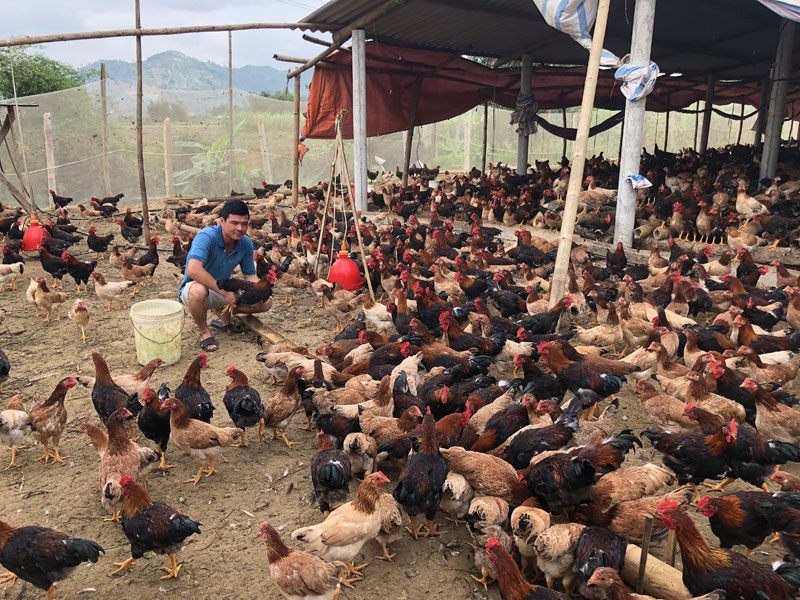
(HBO) - In 2015, some farmers in Dam hamlet, Yen Nghiep commune (Lac Son) discussed, exchanged and selected the investment in the indigenous chicken raising in the direction of trade with the purpose of economic development of the family.
In 2016, stemming from the need to regroup, they formed a hobby group, officially establishing a cooperative group to raise the indigenous chicken in Dam hamlet with 8 households. By the synergy of the members, the cooperative group has maintained and developed, becoming a reliable address for indigenous chicken supply to the market inside and outside the province.
 The chicken farm of the cooperative group in Dam hamlet, Yen Nghiep commune (Lac Son) has been combining farming with high quality products.
The chicken farm of the cooperative group in Dam hamlet, Yen Nghiep commune (Lac Son) has been combining farming with high quality products.
The person who has been devoting much to the development of the cooperative group in Dam hamlet is Mr. Bui Van Linh. He has been acting a leader. More than 30 years old, Mr. Linh has had decades attaching to farming from rice cultivation, sugarcane planting, corn cultivation, pig raising and now building the chicken farms.
At the same time in 2016, some other typical households in Dam hamlet also started to raise chicken, namely Mr. Duong Van Diem, Bui Van Em and Bui Van Vi.
The team leader is the manager, assigning daily tasks to the other members. At the same time, the members of the team promote the spirit of learning, exchanging and sharing experiences so that the production and business activities are convenient and smooth.
Combining forces to develop together, the households in the cooperative group in Dam hamlet not only help each other in terms of techniques but also in the stage of breeding, capital, experience and linking consumer markets.
With the business season focused mainly in April and September and during the lunar New Year, the members of the group have been developing the chicken production based on the set plan. The consumption through the wholesale customers and the buyers themselves account for about 90%, the remaining 10% is sold to the retail customers or the weddings. There have been 15 chicken farms in the whole cooperative group. Each farm maintains an average of 1,500-2,000 chicken a litter, each year 4.6 - 4.7 thousand of chicken are raised.
In order to stabilize on the way of starting a business, the members of the group want to be supported the necessary and sufficient conditions in the future to become the cooperative, applying the procedures and the standards for commercial clean chicken, ensuring food safety, having logos and identification labels to affirm the brand, improving the competitiveness and meeting the consumers’ confidence. On the other hand, the cooperative group has the access to join the chains of production and consumption to create the sustainable livestock value.
In Lac Thuy district, communes have been succeeded in promoting their One Commune-One Product (OCOP) products while others are still struggling to position their typical farming products in market. Some communes in the district still fail to have their products met OCOP programme’s requirements, while others have seen their certifications expired.
The inspectorate agency of Hoa Binh province has issued Official Dispatch No. 1090/TTr-PCTN to provincial departments, agencies, localities, business associations, enterprises, and investors regarding measures to improve informal component indexes of the Provincial Competitiveness Index (PCI).
Hoa Binh is taking concrete steps to improve its investment environment, with a strong focus on supporting businesses, settling obstacles for strategic investors, and creating opportunities for robust development in the coming years.
Under the blazing early summer sun, the construction site of Nhuan Trach Industrial Park (IP) in Luong Son district is abuzz with activities from dawn to dusk, a testament to the determination of the investor to meet their construction targets on schedule.



 The chicken farm of the cooperative group in Dam hamlet, Yen Nghiep commune (Lac Son) has been combining farming with high quality products.
The chicken farm of the cooperative group in Dam hamlet, Yen Nghiep commune (Lac Son) has been combining farming with high quality products.